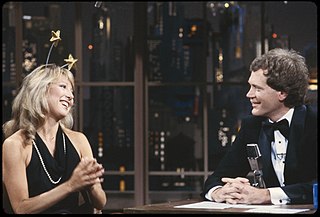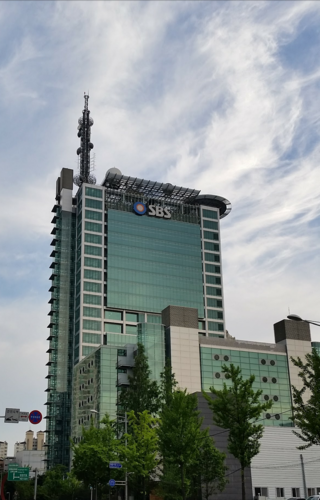Related Research Articles

A talk show is a television programming, radio programming or podcast genre structured around the act of spontaneous conversation. A talk show is distinguished from other television programs by certain common attributes. In a talk show, one person discusses various topics put forth by a talk show host. This discussion can be in the form of an interview or a simple conversation about important social, political or religious issues and events. The personality of the host shapes the tone and style of the show. A common feature or unwritten rule of talk shows is to be based on "fresh talk", which is talk that is spontaneous or has the appearance of spontaneity.
Variety show, also known as variety arts or variety entertainment, is entertainment made up of a variety of acts including musical performances, sketch comedy, magic, acrobatics, juggling, and ventriloquism. It is normally introduced by a compère or host. The variety format made its way from the Victorian era stage in Britain and America to radio and then television. Variety shows were a staple of English language television from the late 1940s into the 1980s.

The Korean Broadcasting System is the national broadcaster of South Korea. Founded in 1927, it is one of the leading South Korean television and radio broadcasters under the Ministry of Economy and Finance.
In South Korea, there are a number of national television networks, the three largest of which are KBS, MBC, and SBS. Most of the major television studios are located on Yeouido and Sangam-dong, Seoul. South Korea became the fourth adopter in Asia when television broadcasting began on 12 May 1956 with the opening of HLKZ-TV, a commercially operated television station. HLKZ-TV was established by the RCA Distribution Company (KORCAD) in Seoul with 186–192 MHz, 100-watt output, and 525 scanning lines.

Seoul Broadcasting System (SBS) is one of the leading South Korean television and radio broadcasters. The broadcaster legally became known as SBS in March 2000, changing its corporate name from Seoul Broadcasting System. Its flagship terrestrial television station SBS TV broadcasts as channel 6 for digital and cable.

Munhwa Broadcasting Corporation is one of the leading South Korean television and radio broadcasters. Munhwa is the Sino-Korean word for "culture". Its flagship terrestrial television station MBC TV broadcasts as channel 11.
Korean drama, also known as K-drama or Koreanovela, refers to Korean-language television shows made in South Korea. These shows began to be produced around the early 1960s, but were mostly consumed domestically until the rise of the Korean Wave in the 1990s. They have since achieved significant international popularity, with millions of viewers across the world.

MBC Group, formerly known as Middle East Broadcasting Center, is a Saudi media conglomerate based in the Middle East and North Africa region. Launched in London in 1991, the company moved its headquarters to Dubai in 2002 and to Riyadh in 2022. It is majority owned by the Saudi government-operated Public Investment Fund.

C31 Melbourne is a free-to-air community television channel in Melbourne, Victoria, Australia. Its name is derived from UHF 31, the frequency and channel number reserved for analogue broadcasts by metropolitan community television stations in Australia.

Food reality television is a genre of reality television programming that considers the production, consumption and/or sociocultural impact of food.

Infinite Challenge is a South Korean television entertainment program, distributed and syndicated by MBC, that ran from 2005 to 2018.

Kim Hyeon-dong, better known as his stage name Kim Gu-ra (김구라) is a South Korean MC, comedian and radio host.

A telenovela is a type of a television serial drama or soap opera produced primarily in Latin America. The word combines tele and novela. Similar drama genres around the world include dizi (Turkey), serial (India), teleserye (Philippines), lakorn (Thailand), teleromanzo (Italy), téléroman, K-drama, J-drama (Japan), C-drama (China) and sinetron (Indonesia).

Running Man (Korean: 런닝맨) is a South Korean variety show, formerly part of SBS' Good Sunday lineup. It first aired on July 11, 2010. It is the longest running Korean variety show.

Survival Audition K-pop Star is a South Korean reality competition television series where three entertainment/talent agencies in South Korea hold worldwide auditions to find the next potential K-pop stars. Preliminary auditions are held around the world in Asia, North America, South America, Europe, and Australia. The final winner debuts with the company of his or her choice, along with a cash prize of three hundred million won, two brand new vehicles, opportunities to become commercial models and casting in dramas, and many more benefits.

Kim Sung-joo is a South Korean television host and a former announcer. A former sports broadcaster and presenter, he became known to the wider public as a variety show host and for his stint on the reality-variety show Dad! Where Are We Going?.
MBC TV is a South Korean free-to-air television channel launched on 8 August 1969 and owned by Munhwa Broadcasting Corporation.

Dunia: Into a New World is a South Korean television entertainment program starring Yunho, Jung Hye-sung, Luda, Kwon Hyun-bin, Sam Okyere, Don Spike, Koo Ja-sung, Hansel, Austin Kang, and DinDin. Season 1 aired on MBC Sundays at 18:45 (KST), beginning on 3 June and ended on 23 September 2018.
References
- ↑ "Television in the United States | History & Shows | Britannica".
- ↑ Carter, Bill (12 May 2014). "Overextended, Music TV Shows Fade". dramacoool.cfd/. Archived from the original on 2024-11-30.
- ↑ Negotiating Democracy: Media Transformations in Emerging Democracies. SUNY series in Global Media Studies. 2007. p. 162. ISBN 978-0-7914-7233-0.
- ↑ Kwak, Ki-sung (2010-08-09). "Broadcasting Deregulation in South Korea". Korean Economic Institute of America. Retrieved 2019-03-28.
{{cite journal}}: Cite journal requires|journal=(help) - ↑ Youm, Kyu Ho; Salwen, Michael B. (1990-03-01). "A Free Press in South Korea: Temporary Phenomenon or Permanent Fixture?". Asian Survey . 30 (3): 312–325. doi:10.2307/2644568. ISSN 0004-4687. JSTOR 2644568.
- ↑ Myeong Han, Lee (2009). "예능의 화두는 스토리텔링이다" [The subject of entertainment is storytelling]. 시사저널.
- ↑ Kim, Daeyoung (2011-08-01). "The Development of South Korean Cable Television and Issues of Localism, Competition, and Diversity". Southern Illinois University Carbondale OpenSIUC. S2CID 14848784.
{{cite journal}}: Cite journal requires|journal=(help) - ↑ Priester, Greg. "Korea's Oldest Singing Competition Show". Asia Society Korea. Retrieved 2019-03-28.
- ↑ Park, Dong-seon (2018). "[Culture Essence]'예능 역사는 곧 대중 트렌드 역사'" [Culture Essence: The history of entertainment is the history of popular trends]. Etnews.
- ↑ Shin, Sang-gie (2015). "텔레비전 예능의 대중문화적 함의 - 한국 지상파 텔레비전 리얼 버라이어티 쇼를 중심으로 예능 프로그램의 현재" [Popular Cultural Implications of Television Arts - Current of Entertainment Programs Focusing on Korean Terrestrial Television Real Variety Shows]. Dongguk University.
- ↑ Mi-rae, Joo (2013). "파일럿 프로그램. 그것이 궁금하다" [Pilot program, I wonder.]. KOCCA, Korea Creative Content Agency. Archived from the original on 2021-06-27. Retrieved 2018-12-23.
- 1 2 "파일럿 프로그램으로 보는 예능 지형도, 방송 트렌드 & 인사이트" [The entertainment topography, the broadcasting trend and the insights viewed as pilot programs](PDF). Korea Content Agency. 2016. Archived from the original (PDF) on 2018-12-04. Retrieved 2018-12-23.
- ↑ I live alone.
- ↑ Ugly Our Baby'
- ↑ Go-eun, Yun (2017). "내 가족의 사생활도 TV로 엿보다…'관찰 예능'은 왜 인기인가" [My family's private life is on TV. Why is 'observation entertainment' popular?]. yeonhap news.
- ↑ Park, Dong-seon (2018). "[Culture Essence]'예능 역사는 곧 대중 트렌드 역사" [Culture Essence: The history of entertainment is the history of popular trends]. Etnews.
- ↑ "연애 예능 대표 콘텐츠 4! 왜 인기 있을까?". 우먼센스 (in Korean). 2022-10-07. Retrieved 2022-12-24.
- ↑ 머니투데이 (2022-07-21). "가짜 연애는 가라! 리얼 연애 예능 전성시대". 머니투데이 (in Korean). Retrieved 2022-12-24.
- ↑ "위험한 유혹, '먹방'" [Dangerous temptation, 'Muk-bang']. yeongnam daily news. 2018.
- ↑ AfreecaTV
- ↑ tasty roads
- ↑ Seon-ae, Gang (2018). "요리예능시대① 먹방→쿡방→그 다음은?" [cooking and entertainment era:Food → Cooking Room → What is next?]. SBS entertainment news.
- ↑ (집밥 백선생)
- ↑ Eun-hyun, No (Summer 2016). "'먹방'의 욕망에서 '쿡방'의 욕망으로" [From the desire of 'food' to the desire of 'cook bang']. History of Cultural Science: 359–360.
- ↑ bu-sung, Kim (2016). 한류 예능프로그램이 한국관광에 미치는 영향: 예능프로그램 런닝맨을 중심으로 [The Effect of Hallyu Entertainment Program on Korean Tourism: Focusing on the Performing Program Running Man] (Thesis). Korea University.
- ↑ an immortal masterpiece
- ↑ yong-soo, Kwon (2017). "서바이벌 경연 프로그램의 포맷과구성에 대한 연구: 복면가왕과 보이스코리아에 대한 비교분석을 중심으로" [A Study on the Format and Composition of Survival Contest Program: Focusing on the Comparative Analysis of Masked Wang and Voice Korea]. Dissertations: Sungkyunkwan University Graduate School of Media Information.
- ↑ jang-geun, oh (2014). "TV 예능프로그램 속 한국인의 가족이데올로기 아빠! 어디가?와 슈퍼맨이 돌아왔다를 중심으로 p.20" [A Study on the Family Deology of Korean People in TV Entertainment Programs, "Dad! Where are you going?" And "Superman Returns" p.20]. Korean Video Culture Society.
- ↑ 'Dojeon Golden Bell'
- ↑ "방송 포맷 수출입 현황과 시사점" [Current Status and Implications of Broadcasting Formats Import and Export]. 방송통신진흥본부 방송통신기획부. 2014. Archived from the original on 2018-12-23. Retrieved 2018-12-23.
- ↑ Tae-young, Kim (2016). "텔레비전 예능 프로그램 속의 다문화주의 JTBC 비정상회담의 '기미가요' 논란을 통해 본 다문화주의 담론의 취약성 연구, p.255-288" [A Study on the Vulnerability of Multiculturalism Discourse through the controversy of 'Kimi Song' of the JTBC Abnormal Talks in Multiculturalism in TV Entertainment Program, p.255-288]. Yeonse University Communication School.
- ↑ In-hee, Lee (2013). "다문화 관련 미디어 보도 프레임 연구에 대한 메타분석: 다문화사회연구, 6권 2호, 83-108" [Meta-analysis of Media Press Frame Research on Multiculturalism: Multicultural Social Research, Volume 6, Volume 2, p.83-108]. DBpia.